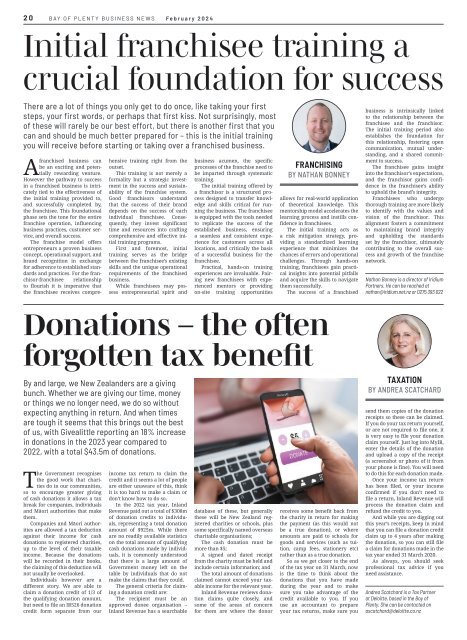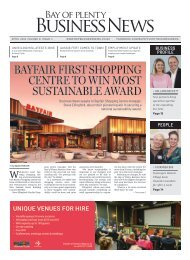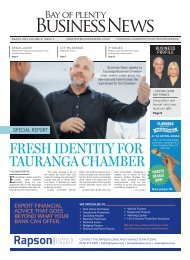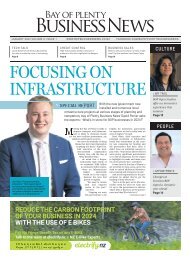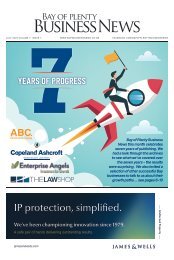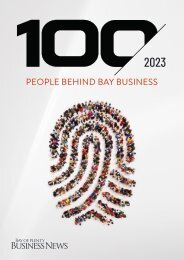February 2024 - Bay of Plenty Business News
From mid-2016 Bay of Plenty businesses have a new voice, Bay of Plenty Business News. This publication reflects the region’s growth and importance as part of the wider central North Island economy.
From mid-2016 Bay of Plenty businesses have a new voice, Bay of Plenty Business News. This publication reflects the region’s growth and importance as part of the wider central North Island economy.
You also want an ePaper? Increase the reach of your titles
YUMPU automatically turns print PDFs into web optimized ePapers that Google loves.
20 BAY OF PLENTY BUSINESS NEWS <strong>February</strong> <strong>2024</strong><br />
Initial franchisee training a<br />
crucial foundation for success<br />
There are a lot <strong>of</strong> things you only get to do once, like taking your first<br />
steps, your first words, or perhaps that first kiss. Not surprisingly, most<br />
<strong>of</strong> these will rarely be our best effort, but there is another first that you<br />
can and should be much better prepared for – this is the initial training<br />
you will receive before starting or taking over a franchised business.<br />
A<br />
franchised business can<br />
be an exciting and potentially<br />
rewarding venture.<br />
However the pathway to success<br />
in a franchised business is intricately<br />
tied to the effectiveness <strong>of</strong><br />
the initial training provided to,<br />
and successfully completed by,<br />
the franchisee. This foundational<br />
phase sets the tone for the entire<br />
franchise operation, influencing<br />
business practices, customer service,<br />
and overall success.<br />
The franchise model <strong>of</strong>fers<br />
entrepreneurs a proven business<br />
concept, operational support, and<br />
brand recognition in exchange<br />
for adherence to established standards<br />
and practices. For the franchisor-franchisee<br />
relationship<br />
to flourish it is imperative that<br />
the franchisee receives comprehensive<br />
training right from the<br />
outset.<br />
This training is not merely a<br />
formality but a strategic investment<br />
in the success and sustainability<br />
<strong>of</strong> the franchise system.<br />
Good franchisors understand<br />
that the success <strong>of</strong> their brand<br />
depends on the success <strong>of</strong> each<br />
individual franchisee. Consequently,<br />
they invest significant<br />
time and resources into crafting<br />
comprehensive and effective initial<br />
training programs.<br />
First and foremost, initial<br />
training serves as the bridge<br />
between the franchisee’s existing<br />
skills and the unique operational<br />
requirements <strong>of</strong> the franchised<br />
business.<br />
While franchisees may possess<br />
entrepreneurial spirit and<br />
business acumen, the specific<br />
processes <strong>of</strong> the franchise need to<br />
be imparted through systematic<br />
training.<br />
The initial training <strong>of</strong>fered by<br />
a franchisor is a structured process<br />
designed to transfer knowledge<br />
and skills critical for running<br />
the business. The franchisee<br />
is equipped with the tools needed<br />
to replicate the success <strong>of</strong> the<br />
established business, ensuring<br />
a seamless and consistent experience<br />
for customers across all<br />
locations, and critically the basis<br />
<strong>of</strong> a successful business for the<br />
franchisee.<br />
Practical, hands-on training<br />
experiences are invaluable. Pairing<br />
new franchisees with experienced<br />
mentors or providing<br />
on-site training opportunities<br />
FRANCHISING<br />
BY NATHAN BONNEY<br />
allows for real-world application<br />
<strong>of</strong> theoretical knowledge. This<br />
mentorship model accelerates the<br />
learning process and instills confidence<br />
in franchisees.<br />
The initial training acts as<br />
a risk mitigation strategy, providing<br />
a standardized learning<br />
experience that minimizes the<br />
chances <strong>of</strong> errors and operational<br />
challenges. Through hands-on<br />
training, franchisees gain practical<br />
insights into potential pitfalls<br />
and acquire the skills to navigate<br />
them successfully.<br />
The success <strong>of</strong> a franchised<br />
business is intrinsically linked<br />
to the relationship between the<br />
franchisee and the franchisor.<br />
The initial training period also<br />
establishes the foundation for<br />
this relationship, fostering open<br />
communication, mutual understanding,<br />
and a shared commitment<br />
to success.<br />
The franchisee gains insight<br />
into the franchisor’s expectations,<br />
and the franchisor gains confidence<br />
in the franchisee’s ability<br />
to uphold the brand’s integrity.<br />
Franchisees who undergo<br />
thorough training are more likely<br />
to identify with the values and<br />
vision <strong>of</strong> the franchisor. This<br />
alignment fosters a commitment<br />
to maintaining brand integrity<br />
and upholding the standards<br />
set by the franchisor, ultimately<br />
contributing to the overall success<br />
and growth <strong>of</strong> the franchise<br />
network.<br />
Nathan Bonney is a director <strong>of</strong> Iridium<br />
Partners. He can be reached at<br />
nathan@iridium.net.nz or 0275 393 022<br />
Donations – the <strong>of</strong>ten<br />
forgotten tax benefit<br />
By and large, we New Zealanders are a giving<br />
bunch. Whether we are giving our time, money<br />
or things we no longer need, we do so without<br />
expecting anything in return. And when times<br />
are tough it seems that this brings out the best<br />
<strong>of</strong> us, with Givealittle reporting an 18% increase<br />
in donations in the 2023 year compared to<br />
2022, with a total $43.5m <strong>of</strong> donations.<br />
The Government recognises<br />
the good work that charities<br />
do in our communities,<br />
so to encourage greater giving<br />
<strong>of</strong> cash donations it allows a tax<br />
break for companies, individuals<br />
and Māori authorities that make<br />
them.<br />
Companies and Māori authorities<br />
are allowed a tax deduction<br />
against their income for cash<br />
donations to registered charities,<br />
up to the level <strong>of</strong> their taxable<br />
income. Because the donations<br />
will be recorded in their books,<br />
the claiming <strong>of</strong> this deduction will<br />
not usually be overlooked.<br />
Individuals however are a<br />
different story. We are able to<br />
claim a donation credit <strong>of</strong> 1/3 <strong>of</strong><br />
the qualifying donation amount,<br />
but need to file an IR526 donation<br />
credit form separate from our<br />
income tax return to claim the<br />
credit and it seems a lot <strong>of</strong> people<br />
are either unaware <strong>of</strong> this, think<br />
it is too hard to make a claim or<br />
don’t know how to do so.<br />
In the 2022 tax year, Inland<br />
Revenue paid out a total <strong>of</strong> $308m<br />
<strong>of</strong> donation credits to individuals,<br />
representing a total donation<br />
amount <strong>of</strong> $925m. While there<br />
are no readily available statistics<br />
on the total amount <strong>of</strong> qualifying<br />
cash donations made by individuals,<br />
it is commonly understood<br />
that there is a large amount <strong>of</strong><br />
Government money left on the<br />
table by individuals that do not<br />
make the claims that they could.<br />
The general criteria for claiming<br />
a donation credit are:<br />
The recipient must be an<br />
approved donee organisation –<br />
Inland Revenue has a searchable<br />
database <strong>of</strong> these, but generally<br />
these will be New Zealand registered<br />
charities or schools, plus<br />
some specifically named overseas<br />
charitable organisations;<br />
The cash donation must be<br />
more than $5;<br />
A signed and dated receipt<br />
from the charity must be held and<br />
include certain information; and<br />
The total amount <strong>of</strong> donations<br />
claimed cannot exceed your taxable<br />
income for the relevant year.<br />
Inland Revenue reviews donation<br />
claims quite closely, and<br />
some <strong>of</strong> the areas <strong>of</strong> concern<br />
for them are where the donor<br />
receives some benefit back from<br />
the charity in return for making<br />
the payment (as this would not<br />
be a true donation), or where<br />
amounts are paid to schools for<br />
goods and services (such as tuition,<br />
camp fees, stationery etc)<br />
rather than as a true donation.<br />
So as we get closer to the end<br />
<strong>of</strong> the tax year on 31 March, now<br />
is the time to think about the<br />
donations that you have made<br />
during the year and to make<br />
sure you take advantage <strong>of</strong> the<br />
credit available to you. If you<br />
use an accountant to prepare<br />
your tax returns, make sure you<br />
TAXATION<br />
BY ANDREA SCATCHARD<br />
send them copies <strong>of</strong> the donation<br />
receipts so these can be claimed.<br />
If you do your tax return yourself,<br />
or are not required to file one, it<br />
is very easy to file your donation<br />
claim yourself. Just log into MyIR,<br />
enter the details <strong>of</strong> the donation<br />
and upload a copy <strong>of</strong> the receipt<br />
(a screenshot or photo <strong>of</strong> it from<br />
your phone is fine). You will need<br />
to do this for each donation made.<br />
Once your income tax return<br />
has been filed, or your income<br />
confirmed if you don’t need to<br />
file a return, Inland Revenue will<br />
process the donation claim and<br />
refund the credit to you.<br />
And while you are digging out<br />
this year’s receipts, keep in mind<br />
that you can file a donation credit<br />
claim up to 4 years after making<br />
the donation, so you can still file<br />
a claim for donations made in the<br />
tax year ended 31 March 2020.<br />
As always, you should seek<br />
pr<strong>of</strong>essional tax advice if you<br />
need assistance.<br />
Andrea Scatchard is a Tax Partner<br />
at Deloitte, based in the <strong>Bay</strong> <strong>of</strong><br />
<strong>Plenty</strong>. She can be contacted on<br />
ascatchard@deloitte.co.nz


